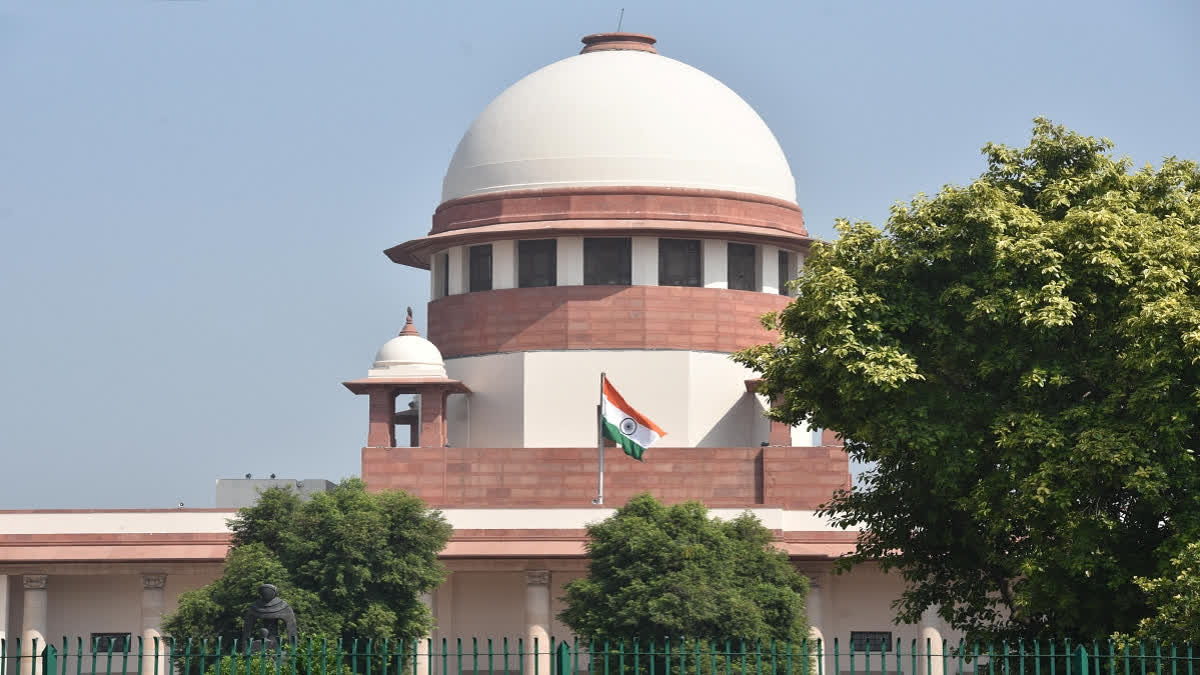New Delhi: The Supreme Court on Tuesday ruled that Bar Council of India (BCI) and state bar councils (SBCs) cannot charge thousands of rupees as enrolment fee for law graduates'. The apex court said the enrolment fee cannot exceed Rs.750 for advocates belonging to the general category and Rs.125 for advocates belonging to SC/ST categories.
A three-judge bench led by Chief Justice of India D Y Chandrachud and comprising justices J B Pardiwala and Manoj Misra said the state bar councils cannot charge enrolment or miscellaneous fee above the amount prescribed.
The apex court made it clear that bar councils cannot charge enrolment fees beyond the express legal stipulation under Section 24(1)(f) of the Advocates Act and the decision of the SBCs to charge exorbitant fees also suffers from the vice of manifest arbitrariness.
The CJI, who authored the judgment on behalf of the bench, said dignity is crucial to substantive equality and the dignity of an individual encompasses the right of the individual to develop their potential to the fullest.
He said the right to pursue a profession of one’s choice and earn livelihood is integral to the dignity of an individual and charging exorbitant enrolment fees and miscellaneous fees as a pre-condition for enrolment creates a barrier to entry into the legal profession. The bench said the bar councils have a responsibility in the public interest to ensure greater representation of persons from marginalized communities in the legal profession.
“The levy of exorbitant fees as a pre-condition to enrolment serves to denigrate the dignity of those who face social and economic barriers in the advancement of their legal careers. This effectively perpetuates systemic discrimination against persons from marginalized and economically weaker sections by undermining their equal participation in the legal profession. Therefore, the current enrolment fee structure charged by the SBCs is contrary to the principle of substantive equality”, said the bench, in its 68-page judgment.
The apex court’s judgment came on a batch of petitions challenging the exorbitant enrolment fees being charged by different state bar councils.
The bench said in 1993, Parliament increased the enrolment fee for general candidates from rupees two-hundred fifty to rupees seven-hundred fifty, without disturbing the fees paid by candidates from the SC and ST community. It added that this shows that Parliament is conscious of the socio-economic marginalization of the SC and ST community. “However, the present enrolment fee structure reinforces the socio-economic marginalization of the SCs and STs. For instance, the Bar Council of Maharashtra and Goa charges a cumulative fee of Rupees fifteen thousand from the general candidates and Rupees fourteen thousand five hundred from SC and ST candidates”, said the bench.
Similarly, in Manipur, the general category candidates pay Rupees sixteen thousand six hundred fifty as an enrolment fee while a candidate from the SC and ST category pays Rupees sixteen thousand fifty. Thus, the candidates from the SC and ST category practically pay as much as the candidates from the general category. “This is evidently against the legislative policy of the Advocates Act”, said the bench, adding that non-conformity with the legislative policy will render delegated legislation arbitrary.
The bench said the effect of charging exorbitant enrolment fees as a pre-condition for enrolment has created entry barriers, especially for people from marginalized and economically weaker sections, to enter into the legal profession.
“The right to practice law is not only a statutory right but also a fundamental right protected under Article 19(1)(g). However, the right of citizens to practice law can be regulated and is not absolute. Under the Advocates Act, only those advocates who are admitted on the State roll have a right to practice throughout the territory of India”, said the bench.
According to the current enrolment fee structure of the SBCs, an advocate has to pay anywhere between rupees fifteen thousand to rupees forty-two thousand as a pre-condition to enrolment. “Imposing excessive financial burdens on young law graduates at the time of enrolment causes economic hardships, especially for those belonging to the marginalized and economically weaker sections of the society. Therefore, the current enrolment fee structure charged by the SBCs is unreasonable and infringes Article 19(1)(g)”, said the CJI.
The apex court said BCI and state bar councils can levy additional charges for the welfare and development work but cannot charge more than the fee stipulated under Advocates Act.
“It is for the SBCs and the BCI to devise an appropriate method of charging fees that is fair and just not only for the law graduates intending to enrol, but also for the advocates already enrolled on the State rolls. There are several reasonable ways by which the SBCs and BCI can and already do collect funds at later stages of an advocate’s career”, said the bench.
The CJI said no case is made out for this court to exercise its power under Article 142 to implement the BCI draft enrolment rules in their current form. “The SBCs have been levying the enrolment fees for a considerable duration and utilizing the collected amounts to carry out their day-to-day functioning. Therefore, we declare that this judgment will have prospective effect. Resultantly, the SBCs are not required to refund the excess enrolment fees collected before the date of this judgment”, said the bench.



